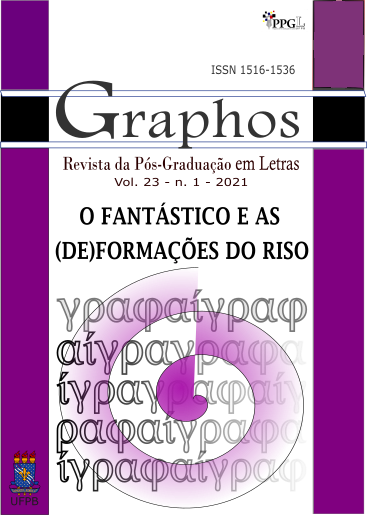The capture of laughter in O romance do pavão misterioso
DOI:
https://doi.org/10.22478/ufpb.1516-1536.2021v23n1.57947Keywords:
Fantastic Literature, Popular Literature, Poetry, Pavão Misterioso, Metamorphosis of the risibleAbstract
The search for a concept, definition or characteristics has been promoted large part of literary studies, besides a tradition that mixes up to contemporality, thus that it does not view, contingently, only through adjectivization approaches, once it would simplify literature subjectiveness, taking its common language, in which is likely other non-poetic or figurative languages. On this way, the main objective of this article is analyzing the laugher that metamorphoses itself in the poem “O Romance do Pavão Misterioso”, by José Camelo de Melo Rezende, multiphasing itself on the tragic tune brought from Greek epic, comprehended in the poem through the geographic aspect and interdicted that disregard the risible as the first comic characteristic. The theoretic-critical articulation allowed the text reading, as an interface for (de)formation of humor, through dualities and/or antagonic propositions present on the fantastic narrative. On this perspective, the theoretic sources come from the initial premises by Tzvetan Todorov (2017) at Fantastic Literature, Vladímir Propp (2002) to recent considerations by David Roas (2014). Still on this context, it is important to point out the studies proposed by George Desmeules (1997), who approaches the category ambivalence to be analyzed. In conclusive lines, it intends to approximate the humor and the fantastic that shows themselves through reverses and changes which alter the risible senses.
Downloads
References
ARISTÓTELES. A poética clássica. Tradução: Jaime Bruna. 12.ed São Paulo: Cultrix, 2005.
CESERANI, Remo. O fantástico. Tradução: Nilton Cezar Tridapalli. Londrina: Eduel, 2006.
DESMEULES, Georges. La littérature fantastique et le spectre de l’humour. France: Instant même, 1997.
MARINHO, Ana Cristina; PINHEIRO, Hélder. O cordel no cotidiano escolar. São Paulo: Cortez, 2012.
MINOIS, Georges. História do riso e do escárnio. Trad. Maria Elena O. Ortiz Assumpção. São Paulo: Ed. UNESP, 2003.
PROPP, Vladímir. As raízes históricas do conto maravilhoso. Trad. Rosemary Costhek Abílio, Paulo Bezerra. 2 ed. São Paulo: Martins Fontes, 2002.
REZENDE, José Camelo de Melo. O romance do pavão misterioso. Fortaleza: Tupynanquim, 2000.
ROAS, David. A ameaça do fantástico: aproximações teóricas. Trad. Julián Fuks. São Paulo: Ed. UNESP, 2014.
TODOROV, Tzvetan. Introdução à literatura fantástica. Trad. Maria Clara Correia Castello. 4 ed. São Paulo: Perspectiva, 2017.
Downloads
Published
Issue
Section
License
Copyright (c) 2021 João Paulo Fernandes

This work is licensed under a Creative Commons Attribution 4.0 International License.







